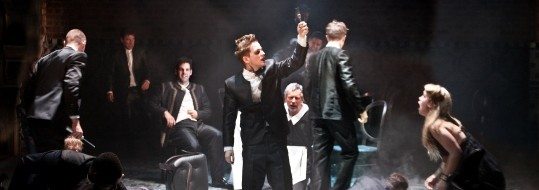Bloody Revenge: Titus Andronicus Review
Know anything about Shakespeare’s Titus Andronicus and you know that it’s a very bad idea to sit near the front. Anything could happen. Any manner of fluids could be sprayed as far back as the third row. It is an experience that must be braved, and this RSC production is one worth braving.
We entered the theatre to be greeted with a scene that could equally have been a hospital or a church. Beautiful blue, black and white mosaic tiles were patterned over the floor and columns; the balcony and windows had the look and feel of an ancient place of worship, and yet the gothic black curtain at the back of the scene with its militant insignia suggested otherwise. The stage design used the Swan Theatre’s thrust stage fantastically to emphasise the scope of the production space.
As the play opened, nurses clad in black habits up to their eyes tended to three unconscious male bodies on stretchers. An old-fashioned radio murmured incomprehensibly. Smoke curled around the wheeled legs of the stretchers. One of the nuns sat casually smoking. Two men strode onstage, one older, one younger and both bruised, bloodied and battered in muddied military uniforms, returned to Rome. And so the revenge tragedy began.
Fire; blood; rape; murder. Titus Andronicus throws everything at you. Within the first five minutes, the tone is set with the heart-wrenching wails of Katy Stephens’ Tamora as her eldest son is sacrificed, and then the Andronicus family’s faces are smeared in his blood. This is one of Shakespeare’s first and most violently bloody plays. And yet, what emerges, especially after the turn of the second half, is the black comedy, more than anything else. Director Michael Fentiman’s creation of a very physical and choreographed play lends it its hilarity, with the physical use onstage of bodies and body parts consistently bringing the audience to an unintentional half-laugh, half-groan of disgust. A pram of body parts is wheeled across the stage, severed heads are held to ears, sundered hands stroke faces, and at one point the mutilated Lavinia carries her father’s bloody, cleaven hand offstage in her own tongue-less mouth.
Demetrius (Perry Millward) and Chiron (Jonny Weldon) have been cast as modern-day, yobbish teenagers wheeling around on bikes. These two fantastic performances, considering Millward is barely 20 years old. Fentiman’s take on Tamora’s sons interestingly considered the pair as two scared young boys, manipulated by the adults around them and their own hormones, rather than as the lust-driven rapists they could have portrayed. The boys’ youth and naivety is especially contrasted with Kevin Harvey’s excellent Scouse Aaron, who takes a sick pleasure in stabbing a nurse to death between her legs.
It is towards the end that Fentiman really stamps his directorial signature, taking inspiration from Julie Taymor’s 1999 film Titus. The fly scene feels utterly out of place and uncomfortably comical set around the breakfast table, with the diminished and disfigured Andronicus family sitting down to eat their toast and eggs like any other day. The hanging of the blind Clown also sits uncomfortably with an audience familiar with the text and expecting comic relief here. Then we find comedy where we might not expect it; Titus’ last moments are spent in a French maid’s dress and the play’s conclusion devolves into a scene of absolute bloody chaos and hilarity. Blood and bodies fly across the stage, and the remaining few left at the end to deliver their lines must tackle the obstacle course of a stage strewn with bodies and props.
We do encounter darker notes as the play closes and Titus suffocates his daughter Lavinia to save her from her shame, rather than stabbing her. Questions of pity, grief and paternal love emerge, and we take note of the refusal to penetrate a daughter who has already twice been violently raped with the phallic, masculine dagger. Hers is also the only death accompanied by hauntingly ethereal music. The play ends ambiguously – Young Lucius holds Aaron and Tamora’s mixed-race child, and raises a pie-cutter as if to stab the child as Aaron the Moor looks on in horror.
The first half was the more than slightly unconvincing and as one of Shakespeare’s first plays, it is often written off as one his weaker. But despite an unconvincing start, the set is fantastic, the acting overall excellent and the play definitely worth seeing before its final run – just avoid the front row, or be prepared for mud and blood to come your way.
Titus Andronicus is playing at the RSC’s Swan Theatre until 26 October.

Comments